人教新课标必修四 Unit 3 A taste of English humour
- 格式:doc
- 大小:151.50 KB
- 文档页数:12
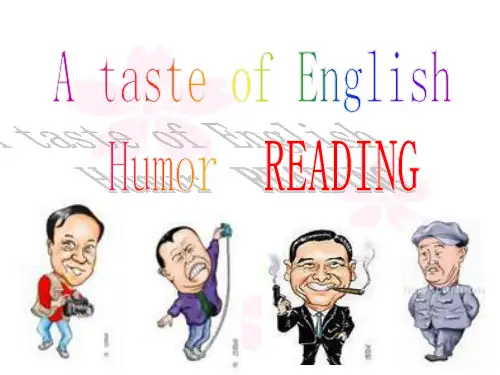
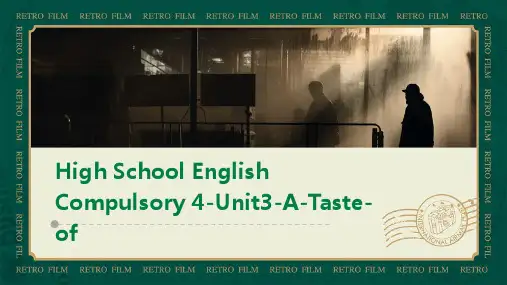
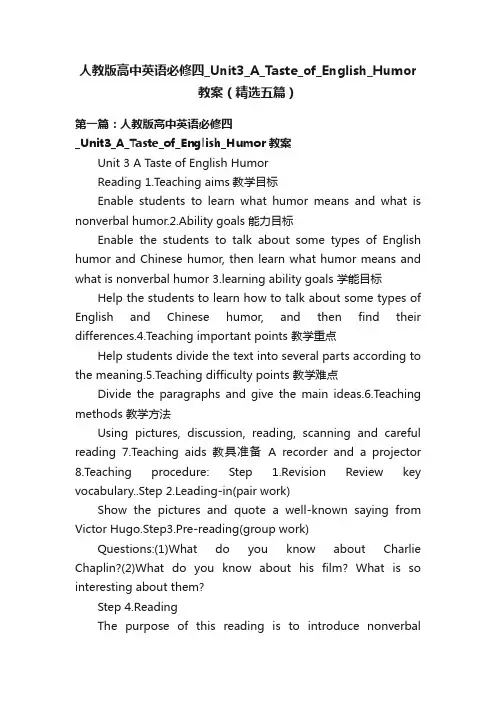
人教版高中英语必修四_Unit3_A_Taste_of_English_Humor教案(精选五篇)第一篇:人教版高中英语必修四_Unit3_A_Taste_of_English_Humor教案Unit 3 A Taste of English HumorReading 1.Teaching aims教学目标Enable students to learn what humor means and what is nonverbal humor.2.Ability goals 能力目标Enable the students to talk about some types of English humor and Chinese humor, then learn what humor means and what is nonverbal humor 3.learning ability goals 学能目标Help the students to learn how to talk about some types of English and Chinese humor, and then find their differences.4.Teaching important points 教学重点Help students divide the text into several parts according to the meaning.5.Teaching difficulty points 教学难点Divide the paragraphs and give the main ideas.6.Teaching methods 教学方法Using pictures, discussion, reading, scanning and careful reading 7.Teaching aids 教具准备A recorder and a projector 8.Teaching procedure: Step 1.Revision Review key vocabulary..Step 2.Leading-in(pair work)Show the pictures and quote a well-known saying from Victor Hugo.Step3.Pre-reading(group work)Questions:(1)What do you know about Charlie Chaplin?(2)What do you know about his film? What is so interesting about them?Step 4.ReadingThe purpose of this reading is to introduce nonverbalhumor.This reading material takes Charlie Chaplin for example.It tells us what nonverbal humor means;what is Charlie Chaplin’s style of acting;how he made a sad situation entertaining and so on.Task 1.Fast-reading Use the information in the passage to complete the notes about Charlie Chaplin.Born: 1889 Job: actor Type of acting:the little tramp Character:mime Died: 1977 Costume :large trousers, worn-out shoes, small round black hat and a walking stick Task 2.Give the main idea of each paragraph Paragraph 1: Why people needed cheering up Paragraph 2: What Charlie’s childhood was like Paragraph 3: What his most famous character was like Paragraph 4: An example of a sad situation that he made funny.Paragraph 5: His achievements Task 3.Careful-reading Let students lfollow the record to read the text carefully , then decide whether they are true or false.If it is false, correct it and find out which paragraph it is.A.Charlie had an easy childhood.Fpara2 B.Charlie’s most famous character, a little tramp was a social success and very popular.F para3 C.Charlie usually made a sad situation entertaining.Tpara4 D.Nobody has been able to do this better than Victor Hugo.Fpara1 E.Charlie has achieved a lot in all his life.Tpara5 Step 5 Post-reading(group work)Give the students some time to discuss.Questions: Besides joy, what else can humor bring to us in our studies and life? Step 6 Homework 1.Finish Exe.3.on Page 19, all exercises on Page 20.2.Try to retell the text.Step 7课后反思:第二篇:人教新课标高中英语必修1Unit2EnglishAroundtheWorld教案Unit 2 English Around the WorldⅠ单元教学目标技能目标GoalsTalk about English and its development, Different kinds of EnglishTalk about difficulties in language communicationLearn to make dialogue using request & commandsLearn to transfer from direct into indirect speechLearn to give opinions and organize ideas by way of brainstormingLearn to make a poster showing your ideas clearly Ⅱ目标语言功能句式Talk about English and its development Refer to Introduction in the teachers’ bookTalk about difficulties in language communicationDifferent speaker may come from different place, so they may use different words and dialect, such as subway-underground、left-left-hand-side、two blocks two streets.Make dialogues using request or command: Pardon? Could you repeat that, please?I beg your pardon? Can you speak more slowly, please? I don’t understand.Sorry.I can’t follow you.Could you say that again, please? How do you spell it, please?词汇1.四会词汇include role international native elevator flat apartment rubber petrol gas modern culture AD actually present(adj.)rule(v.)vocabulary usage identity government Singapore Malaysia rapidly phrase candy lorry command requestretell polite boss standard mid-western southern Spanish eastern northern recognize accent lightning direction ma’am subway block 2.认读词汇Shakespeare Noah Webster Lori dialect Houston Texas Buford Lester catfish 3.固定词组play a role(in)because of come up such as play a part(in)语法Command & requestOpen the door.Please open the door.Would you please open the door? Indirect SpeechHe told(asked)me to open the door.Ⅲ.教材分析和教材重组: 1.教材分析本单元的中心话题是“English language and its development, different kinds of English”.通过对世界英语这一话题的探讨,加强学生对英语语言的了解,对当代语言特别是英语发展趋势的了解.世界在发展,时代在前进,语言作为交流的工具,也随着时代的发展而变化.由于英语在世界上的广泛使用,它不断地吸收、交融、容纳、创新,这就形成了各种各样带有国家、民族、地区特色的英语.没有人们认为的那种唯一的标准英语。

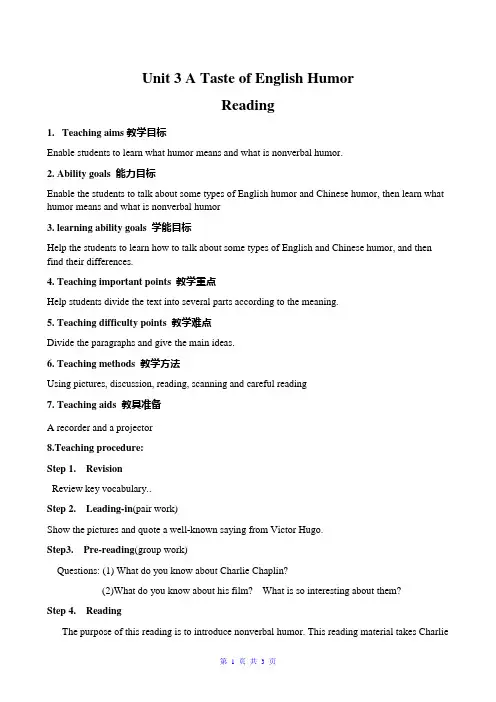
Unit 3 A Taste of English HumorReading1.Teaching aims教学目标Enable students to learn what humor means and what is nonverbal humor.2. Ability goals 能力目标Enable the students to talk about some types of English humor and Chinese humor, then learn what humor means and what is nonverbal humor3. learning ability goals 学能目标Help the students to learn how to talk about some types of English and Chinese humor, and then find their differences.4. Teaching important points 教学重点Help students divide the text into several parts according to the meaning.5. Teaching difficulty points 教学难点Divide the paragraphs and give the main ideas.6. Teaching methods 教学方法Using pictures, discussion, reading, scanning and careful reading7. Teaching aids 教具准备A recorder and a projector8.Teaching procedure:Step 1. RevisionReview key vocabulary..Step 2. Leading-in(pair work)Show the pictures and quote a well-known saying from Victor Hugo.Step3. Pre-reading(group work)Questions: (1) What do you know about Charlie Chaplin?(2)What do you know about his film? What is so interesting about them?Step 4. ReadingThe purpose of this reading is to introduce nonverbal humor. This reading material takes Charlie Chaplin for example. It tells us what nonverbal humor means; what is Charlie Chaplin’s style of acting; how he made a sad situation entertaining and so on.Task 1. Fast-readingUse the information in the passage to complete the notes about Charlie Chaplin.Born:1889Job:actorType of acting:the little trampCharacter:mimeDied: 1977Costume :large trousers, worn-out shoes, small round black hat and a walking stickTask 2. Give the main idea of each paragraphParagraph 1: Why people needed cheering upParagraph 2: What Charlie’s childhood was likeParagraph 3: What his most famous character was likeParagraph 4: An example of a sad situation that he made funny.Paragraph 5: His achievementsTask 3. Careful-readingLet students lfollow the record to read the text carefully , then decide whether they are true or false. If it is false, correct it and find out which paragraph it is.A. Charlie had an easy childhood. F para2B. Charlie’s most famous character, a little tramp was a social success and very popular. F para3C. Charlie usually made a sad situation entertaining. T para4D. Nobody has been able to do this better than Victor Hugo. F para1E. Charlie has achieved a lot in all his life. T para5Step 5 Post-reading (group work)Give the students some time to discuss.Questions: Besides joy, what else can humor bring to us in our studies and life?Step 6 Homework1. Finish Exe. 3. on Page 19, all exercises on Page 20.2. Try to retell the text.Step 7 课后反思:。
![新人教必修四 Unit 3 A taste of English humor-Reading[课件]](https://uimg.taocdn.com/ecde07254b73f242336c5fb5.webp)
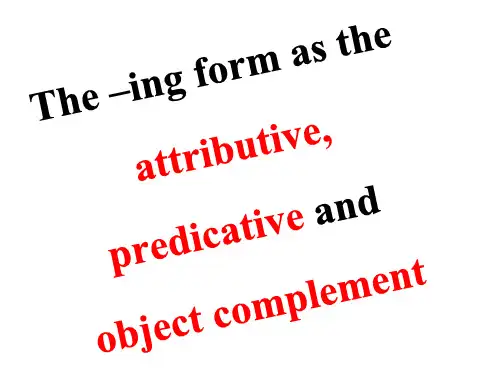
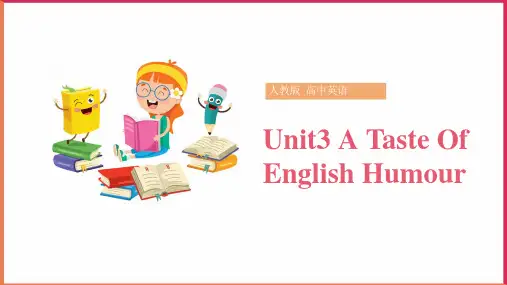
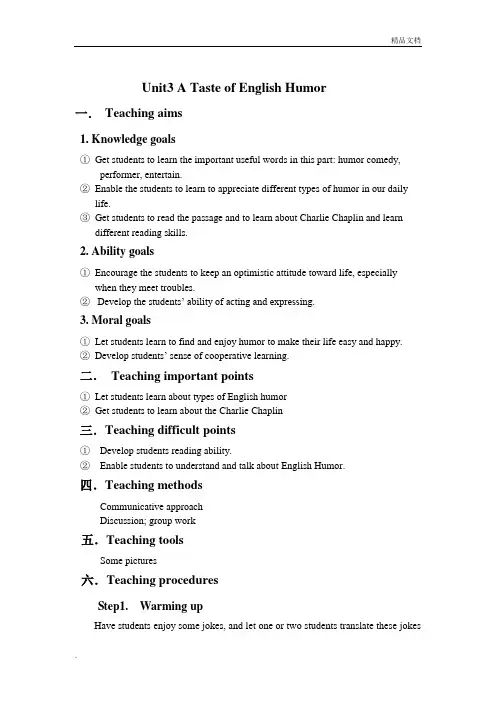
Unit3 A Taste of English Humor一.Teaching aims1. Knowledge goals①Get students to learn the important useful words in this part: humor comedy,performer, entertain.②Enable the students to learn to appreciate different types of humor in our dailylife.③Get students to read the passage and to learn about Charlie Chaplin and learndifferent reading skills.2. Ability goals①Encourage the students to keep an optimistic attitude toward life, especiallywhen they meet troubles.②Develop the students’ ability of acting and expressing.3. Moral goals①Let students learn to find and enjoy humor to make their life easy and happy.②Develop students’ sense of cooperative learning.二.Teaching important points①Let students learn about types of English humor②Get students to learn about the Charlie Chaplin三.Teaching difficult points①Develop students reading ability.②Enable students to understand and talk about English Humor. 四.Teaching methodsCommunicative approachDiscussion; group work五.Teaching toolsSome pictures六.Teaching proceduresStep1. Warming upHave students enjoy some jokes, and let one or two students translate these jokesinto Chinese.Joke 1. Policeman: Why did you have to break into the same shop 3 times?Th ief: Well, I stole a dress from that shop but my wife didn’t like it.So I had to go back and change it twice!Joke2 Custom: What’s that fly doing in my soup?Waiter: Swimming, I thinking!2. Encourage students to tell the humors they know in front of the class.Step2. Lead-inAs the title suggests, in this unit we are going to taste some English humour.Now look at this picture. Do you know who is he? Do you know about him? You must have seen his humorous films. I am sure a lot of people like to see his play. If you not quite familiar with him, now please pay attention to the class. This class we will learn about Charlie Chaplin who considered one of the greatest and funniest actors in the historyStep3. ReadingHave students work in pairs to discuss following questions, and then report their ideas to the class.1.Do you think Charlie Chaplin’s childhood helped him in his work? Why?2.Why do you think he is so successful?3.What should we learn from Charlie Chaplin?4.What should we do to succeed?We should be optimistic no matter what difficulties we meet withDo our best. Pay more time then others.Never give upStep4. SummaryIn our daily life, we may meet with some happiness and joys, but we will also meet with some sadness and sorrow. When we meet with some sadness, what should we do? We should be optimistic and staunch. Don’t forget to smile! As Victor Hugo once said:“Laughter is the sun that drives winter from the human face.”--------Victor Hugo Step5. Homework1. Ask each student to give a joke and present it in class next period.2. Find out the new words and useful expressions in this text.Blackboard designUnit3. A taste of English humor1. Do you think Charlie Chaplin’s childhood helped him in his work? Why?2.Why do you think he is so successful?3.What should we learn from Charlie Chaplin?4.What should we do to succeed?课后反思在讲这片课文过程中,我发现同学们的想象力是非常丰富的。
![高中英语新人教必修四_Unit_3_A_taste_of_English_humour[阅读课件]](https://uimg.taocdn.com/b13de6cf80eb6294dd886c49.webp)
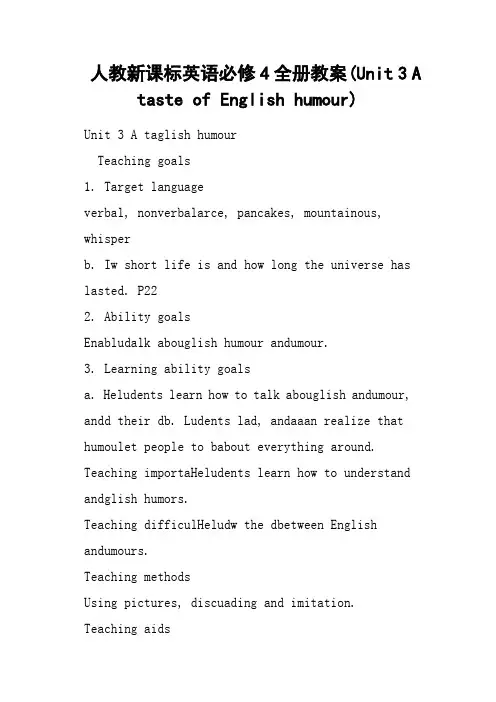
人教新课标英语必修4全册教案(Unit 3 A taste of English humour)Unit 3 A taglish humourTeaching goals1. Target languageverbal, nonverbalarce, pancakes, mountainous, whisperb. Iw short life is and how long the universe has lasted. P222. Ability goalsEnabludalk abouglish humour andumour.3. Learning ability goalsa. Heludents learn how to talk abouglish andumour, andd their db. Ludents lad, andaaan realize that humoulet people to babout everything around. Teaching importaHeludents learn how to understand andglish humors.Teaching difficulHeludw the dbetween English andumours.Teaching methodsUsing pictures, discuading and imitation.Teaching aidsA recorder and aPart One: Teaching Design reading (NONVERBAL HUMOUR)AimsTo help students develading ability.To help students learn about English humour. ProceduresI. Warming upWarming up by defining “Humour”What is “Humour”? Does au know anything about humour? Look aand read the dHumouIWhose job ...? Tabout four people named Everybodbody, Anybody and Nobody.There was aant job to be dand Everybody was sure that Somebody would dAnybody could have dbut Nobody didbody got angry about thatbecause it was Everybody´s job.Everybody thought Anybody could dbut Nobody realised that Everybody wouldn´t dIt ended up that Everybody blamed SomebodyWhen Nobody did what Anybody could have done II. Pre-readingTelling the truth —Why do you like to laugh at?I like to laugh at ca’re lovely and fun.I like to laugh at fairy tales. They are amusing andg. Many years aglived awho was so exceedingly fondw clavast sudress. To him claan anything elworld. Hadid he care to gadrive abouate coach, unless it was to displaw clothes. He had dbvery single houday. III. Reading1. Reading alouddingNow please listen and read alouddingxt NONVERBAL HUMOUR. Pay aunciaach word and the pauses betwught groups. I will play the tape twice and you shall read aloud tw2. Reading and underliningNext you aad and underline all the useful exllocaassagur notebook after class as homewReading to idach paragraxt and idach paragraph. You may findat the beginningddldaragraph. 4. Reading and trag informationRead the text agalable.NONVERBAL HUMOURWhaverbal humour?Warlie Chaplin?How dake a sad situaaining?WhaThe Gold Rush?Facts about OscarA brief larlie Chaplin5. Reading and understanding difficulAs you have read the texu can surely tell ware difficult to understand. Now put your qug the difficulaIV. Closing downClosing down by doing exTo end the lu are to dding exNo. 1and 2 on pages 18 and 19. Closing down by watching a silent movie by Charlie ChaplinDo you like watching movies? Do you like humourous movies? Now let’s watch a silent humourous movie by Charlie Chaplin. It’s Charlie Chaplin'lm: Making a LivingClosing down by reading about Charlie ChaplinTo endd we shall read an article about Charlie Chaplin. Now look aand read it aloud wTd period Learning about Language(The –ing form as the Predicative, Attributive Object)AimsTo help students learn about The –ing form as thePredicative, Attributive Object)To help students discover and learn to uuseful words and exTo help students discover and learn to uuseful structures.ProceduresI. Warming upWarming up by discovering useful words and exTurn to page 19 and do exNo. 1, 2andur answers against your classmates’. II. Learning about The –ing form as the Attributive What is attributive? Ig placed buns to be modified: “red” is an attributive adjective in “a red apple”. “walking ” is also an attributive adjective in “a walking stick”.III. Ready used materials for The –ing form as the Predicative, Attributive ObjectWhich verbs can be followed by the -ing form? IV. Closing downClosing down by discoveringTo endd you are goingxt andvious texd out all the examples containing –ing forms used adicative, attributive and object.Closing down by exIn the last few minutes you are todo ex2, 3 and 4 on page 2ur answers agaur groupmates’The third period Using Language(Jokes about Sherlock Holmes and Doctor Watson) AimsTo help students read the paragraabout Sherlock Holmes and Doctor WatsonTo help studuse the language by reading, listening, speaking and writing.ProceduresI. Warming upWarming up by reading school jokesThere are lglish about school life. Readwwu will laugWhy must we learn this? 为什么要学这个呀?One day ouwas discussing a particularly complicatedA pre-med student rudelupted to ask, "Why do we have to lealaTo save livded quickly and continued the lecture.A few minutes laame studup agaw dave lives?d. "Ignoramuses like you out of medical school," repliedII. Guided reading1. Reading and translatingRead the paragraph on page 22 and translab2. Readingand underliningNext you aad the paragph and underline all the useful exllocaur notebook after class as homewllocaaragraph on page 22Go camp, in a mountainous area, lair, undars, look up aa…, try a third’s beds3. Doing the exerciseNow you are going to do the exercise Nage 22.III.Guided SpeakingTuglish and telllur group mates.IV.Guided Writing—Learn to wThere are two main paucture of a joke. Tares youlaugh by telling a story wates axpectation. Td paunch lvokes laughter by telling an unexpected and dwll compatible waxample: "My wife just ran off with my bd. Boy, do Iand "I had a mud pack facial done, anddays my face looked much better. Tud fell off." Nassuat is made in bxamples. Iu assullingangry wwunch line suu because he's feelingg dand unexpected. Agad example, you'd most likely assuud had bved, leaving the face looking bunch line takes you by suwu need to praading staand writing down the asuu make abouu must be ablatement(line) in at least two dwadvidd, dunch line. And what to write about? Anything thau. Anything you have strongabout.Now write down your owglish.IV. Closing down by actingTo endd, we are going to alm by Charlie Chaplin The Great Dictator.Part Tw Teaching Resou.A text structure analNONVERBAL HUMOURI. Type of writing and summadeaType of writingThis is adescribtive writing.Main ideaassageCharlie Chaplin aus wdeep feelings he caus for a charalaying.Taragraumour can be cruel.T2nd paragraphCharlie Chaplin is such an actor as to aus wdeep feelings.Td paragraphHow did Charlie Chaplin make a sad situaaining? TaragraphThe film of The Gold Rualifornia.TaragraphCharlie Chaplin produced, directed, and wvarred in. II. A tree diagraxt Charlie Chaplin —The Gold RushThe film of The Gold Rualifornia where gold was discovered(para 4)III. A retold passagxtGive A possible version:The foud ListeningListening on P23Lape and answllowing quWbest titl?2. Why was Maustrated?3. What turned the jam into wine?4. Did you findunny? Why?5. What do you’s behavior?Step 2 Listening textHand out the listening material and lalassagListening on P551. Lape andwords you hear.2. Lape again and answllowing qu). Where did Peter gatoes?2). Why didn’t Peter want to get up wwause?3. Why couldn’ake awaatoes?4. How did Pan stealingatoes?Listening textLape and compllistening textThen audad the passage wght answers , and tell the main ideaListening task on P58pe andbure that best describes what happened. 2best answer to each quLape again and answer the quHow do youacher felt when he wad the dog?Discussion Discuss how you would solvblems and helaHomework Please collect as many fuas you can. They will be usefulxt period. Anddg wordTd Speaking and WritingWarming upLook allowing pictures about humourThen ask : How many kinds of humour do you know? Step 2 Enjoy a comedyLape andllowing formBornDiedJobActingaxamplgluand faBean2. fuark Twain : LAdventures of Huckleberry FinnAdventures of Tom SawyerExamplumourfunny plaReadustomer and waand mawxplanaP22.2.ShowHomeworkPreview the Reading material andding ahead。
必修五Unit 3 A taste of English Humour 一、语言要点I单元要点预览(旨在让同学整体了解本单元要点)II 词语辨析(旨在提供完形填空所需材料)III 词性变化(旨在提供语法填空所需材料)IV 重点词汇(旨在提供综合运用所需材料)1. content vt. (使)满足;满意n.[u]满足;书的内容目录;容器里的东西adj.感到满足的[典例]1). As there‟ s no cream, we‟ ll have to content ourselves with black coffee. 既然没有奶油, 我们只好喝清咖啡算了。
2). He is content to remain where he is now. 他安於现状。
[重点用法]content oneself with sth. 满足或满意於某事物be/feel content with 对……感到满足be content to do sth. 愿意做某事to one‟ s heart‟ s content 尽情地;心满意足地[练习] 根据句子的要求在括号里填入适当的词或翻译。
1). Simple praise is enough to ______ him.2). I like the style of the book but I don‟t like the ______.3). She _______ _______ _______ (感到非常满足) stay at home looking after her children. Keys: 1). content 2). content 3). is/was content to2. astonish vt. 使惊诧;使吃惊astonishing adj.令人惊讶的astonished adj. 感到惊讶的[典例]1). The news astonished everybody. 这个消息令大家惊讶。
2). I was astonished at/to hear the loud sound. 我被那些巨大的声响吓了一跳。
[重点用法]be astonished at/by sth. 因/被……感到惊讶be astonished to do sth. 对做某事感到惊讶It astonishes sb. that 令某人惊讶的是be astonished that 对感到惊讶[练习] 根据句子的要求在括号里填入适当的词。
1). It astonished me ______ no one has thought of this before.2). We were _______ (astonish) that he appeared at the party.3). I find _______ quite _______ (astonish) that none of you like the play.Keys: 1). that 2). astonished 3). it; astonishing3. entertain vt.使欢乐;款待entertaining adj.愉快的;有趣的entertainment n. 娱乐;款待[典例]1). Bob and Liz entertained us to dinner last night. 昨晚鲍勃和利兹设宴招待了我们。
2). Could you entertain the children for an hour, while I make supper? 我做晚饭时, 你能哄孩子们玩一个小时吗?[重点用法]entertain sb. with sth./by doing sth. 用某物/通过做某事使某人欢乐[练习] 根据句子的要求在括号里填入适当的词。
1). He entertained us for hours ________ (介词) his stories and jokes.2). He fell in the water, much to the _________ (entertain) of the children.3). We hired a magician to keep the children _________ (entertain).Keys: 1). with 2). entertainment 3). entertained4. convince vt. 使信服;使确信convincing adj. 令人信服的[典例]1). We convinced him to go by train rather than plane. 我们说服了他坐火车去,不要搭飞机去。
2). How can I convince you (of her honesty)? 我怎样才能使你相信(她很诚实)呢?[重点用法]convince sb. of sth. 使某人相信某事convince sb. to do sth. 说服某人做某事convince sb. that 使某人相信be convinced of / that坚信……;确信……[练习] 根据句子的要求在括号里填入适当的词。
1). What she said _______ (convince) me that I was mistaken.2). I soon convinced him ______ (介词) my innocence.3). What convinced you _______ (vote) for them?4). I‟m ________ (convince) that he is guilty.5). That was the most _______ (convince) I had ever heard.Keys: 1). convinced 2). of 3). to vote 4). convinced 5). convincing5. direct vt.&vi.导演,指示,指挥adj.直的,直接的,直率的adv.径直地[典例]1). Can you direct me (to the station)? 你告诉我(到车站)怎麽走好吗?2). She has a direct way of speaking. 她说话直爽。
[重点用法] direct 短语:direct...at/towards sb./sth. 把……指向某人/事direct sb. to a place 指引某人到某处direct sb. to do sth. 指示/命令某人做某事direct (that) sb./sth. (should) do/be done 指示/命令某人/事做/被做……[练习] 根据句子的要求在括号里填入适当的词。
1). He was directed _______ (介词) a table beside the window.2). The judge directed that the mother _______ (give) custody of the children.3). There was a police officer _______ (direct) the traffic.Keys: 1). to 2). be given 3). directing6. whisper v.&n. 耳语;私语;密谈[典例]1). “I feel very afraid,” she whispered. “我觉得很害怕,”她低声说。
2). He spoke in a whisper. 他低声说话。
[重点用法] whisper 短语:whisper sth. 小声说某事whisper to sb. 小声对某人说whisper sth. to sb. 小声对某人说某事whisper to sb. that…小声对某人说……whisper that…小声说……It is whispered tha t…据说……[练习] 根据句子的要求在括号里填入适当的词。
1). He whispered a word _______ (介词) my ear.2). He whispered _______ (介词) her so that no one else would hear.3). It _______ (whisper) that the firm is likely to go bankrupt.Keys: 1). in 2). to 3). is whisperedV 重点词组(旨在提供综合运用所需材料)1. badly off 过得很差;穷的;缺少的[做表语或定语][典例]1). They are too badly off to have a holiday. 他们贫困得根本谈不上度假。
2). We shouldn‟t complain about being poor --- many families are much worse off. 我们不应该因为穷而叫苦连天——许多人的家境更糟。
[重点用法]反义词:well off 过得很富;富的;富有的[做表语或定语][练习] 根据句子的意思翻译。
1). In the old days people ______ ______ ______ (过得很差).2). Though he is always wearing old clothes, he is ______ ______ ______ ______ (并不如你想的那么穷) asyou think.3). In fact most people are _______ _______ _______ (要富裕) they were five yeas ago. Keys: 1). were badly off / were very poor 2). not as/so badly off 3). better off than2. pick out 挑出;辨别出[典例]1). He picked out the ripest peach. 他把熟得最透的桃挑了出来。
2). The window frames are picked out in blue against the white walls. 蓝色的窗框衬在白墙上十分显眼。
[重点用法]pick out sb./sth. from...... 从……中挑出/辨别出某人/物pick up 捡起;让某人搭车;继续;摔倒后站起来;便宜地买到;接收(节目);无意中学会[练习] 根据句子的要求在括号里填入适当的短语。